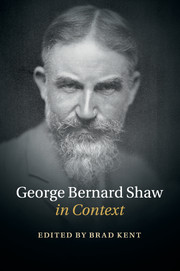Book contents
- Frontmatter
- Dedication
- Contents
- List of illustrations
- Notes on contributors
- Preface
- Acknowledgements
- A Chronology of Shaw's Works
- List of abbreviations
- PART I PEOPLE AND PLACES
- PART II THEATRE
- PART III WRITING AND THE ARTS
- PART IV POLITICS
- PART V CULTURE AND SOCIETY
- 31 Celebrity
- 32 Education
- 33 Evolutionary theory
- 34 Health and vegetarianism
- 35 Language
- 36 Nature
- 37 Philosophy
- PART VI RECEPTION AND AFTERLIFE
- Further reading
- Index
- References
37 - Philosophy
from PART V - CULTURE AND SOCIETY
Published online by Cambridge University Press: 05 October 2015
- Frontmatter
- Dedication
- Contents
- List of illustrations
- Notes on contributors
- Preface
- Acknowledgements
- A Chronology of Shaw's Works
- List of abbreviations
- PART I PEOPLE AND PLACES
- PART II THEATRE
- PART III WRITING AND THE ARTS
- PART IV POLITICS
- PART V CULTURE AND SOCIETY
- 31 Celebrity
- 32 Education
- 33 Evolutionary theory
- 34 Health and vegetarianism
- 35 Language
- 36 Nature
- 37 Philosophy
- PART VI RECEPTION AND AFTERLIFE
- Further reading
- Index
- References
Summary
The very concept of a philosopher, Bernard Shaw wrote in 1896, is ‘something unintelligible to an Englishman’. So unintelligible, in fact, that the only example he could find with any public prominence was himself: ‘To make my readers realize what a philosopher is, I can only say that I am a philosopher’. Of course, Shaw could not be considered a philosopher in any conventional sense, even by the loosest standards. Though prolific, he would at no point pen a dedicated study in an identifiable area of philosophical specialisation – epistemology, metaphysics, ethics, aesthetics, logic or the like, though elements of each of these fields would pepper his prefaces and plays. Even the one prose exercise that he expressly classified as a work of philosophy, The Quintessence of Ibsenism – described as a ‘minute treatise’ that he was responsible for ‘contributing to the literature of philosophy’ – was more a work of extended dramatic criticism than a true philosophical study. Yet Shaw did not necessarily mean his self-classification in jest. Ever the iconoclast, he took seriously the proposition that philosophical writing should encompass far more than the circumspect academic treatise. ‘Any studious, timorously ambitious bookworm can run away from the world … [and] build some silly systematization’, he wrote. Philosophy properly practiced grew from an active engagement with the world and took on forms far more winning than dry prose. ‘The artist-philosophers’, he famously declared in the Epistle Dedicatory to Man and Superman, ‘are the only sort of artists I take quite seriously’ (CPP II: 519). And largely the only sort of philosophers he took seriously as well – for between artist and philosopher, he explained, ‘the difference … is merely formal’ (CPP II: 524). Thus it was ultimately on the basis of his art that he staked his claim to the title of philosopher. As much as philosophy was an enterprise deeply important to Shaw's self-conception as a writer, it was also, equally, a field of study whose strict boundaries and basic disciplinary assumptions he meant explicitly to expand.
If Shaw's self-proclaimed status as a philosopher proper must be held somewhat in abeyance, his status as one of the great popularisers of philosophy within his era is undeniable.
- Type
- Chapter
- Information
- George Bernard Shaw in Context , pp. 306 - 314Publisher: Cambridge University PressPrint publication year: 2015



